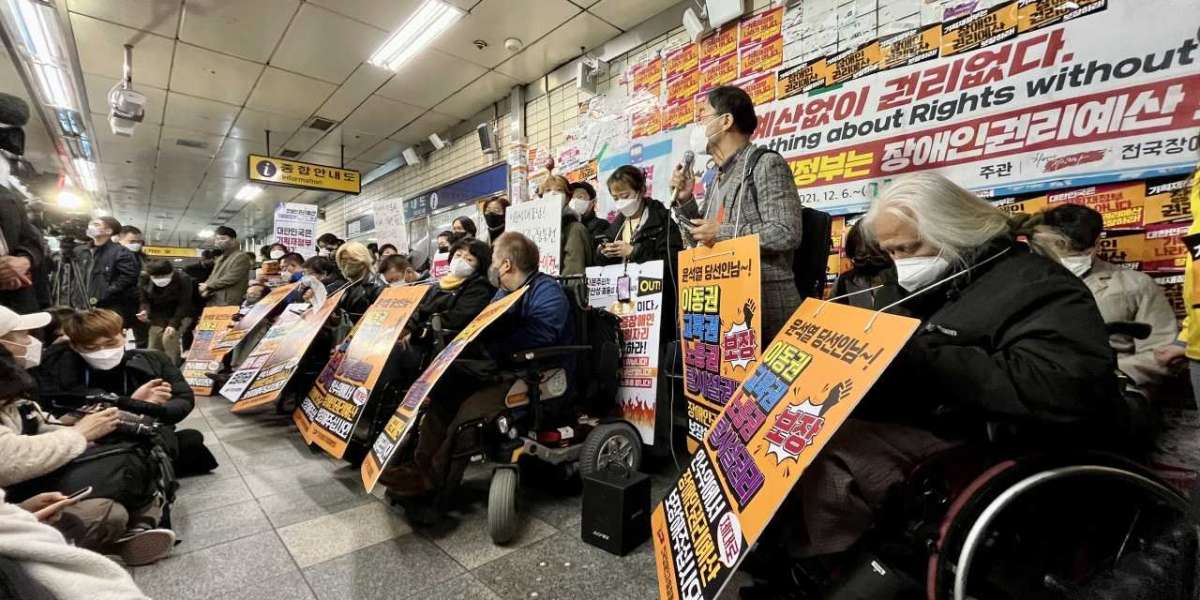Solidarity Against Disability Discrimination, a disability advocacy group that has recently staged rallies at subway stations, is encountering an increase in online hatred, with some individuals feeling particularly empowered by the actions of a conservative political leader.
People Power Party chairman Lee Jun-seok has described the protest as "uncivilized" and "illegal" in a series of Facebook posts. According to him, the demonstrators were purposely delaying subway service during peak hours, and they were staging the demonstration just as a conservative administration was due to take over the reins of government.
"The insistence on getting one's own way at the expense of creating inconvenience to the majority of law-abiding individuals cannot be accepted in a civilized society," Lee stated during the party's supreme council meeting on Monday.
In his words, "If we allow this kind of approach to continue, then all issues will be resolved via abnormal competition to see who can create the most amount of dread or inconvenience, rather than through sensible dialogue or conversation."
Park Kyung-seok, the leader of the activist group, posted a screenshot of some of the hateful remarks directed at demonstrators and persons with disabilities in general on Facebook on Sunday. Many of the comments repeated statements made by Lee against the protest, which Park shared via Facebook.
Afterwards, he called on the leader of the opposition party to express regret for "distorting the picture." "I want Mr. Lee to consider the realities that wheelchair users still face in terms of gaining access to public transit," Park added.
The leader of the country's incoming ruling party has refused to accept responsibility.
"I have no intention of expressing regret. Lee reacted in a second message on the same social media platform on Wednesday, saying, "I don't see why I should." Afterwards, he argued that the group was threatening to protest him until he apologized to them.
Although the digital assaults hurled at the protestors were "something familiar," a member of Solidarity Against Disability Discrimination noted in a phone interview that the recent social media confrontation "had spawned a new wave of verbal insults."
According to her, "It is regretful that Mr. Lee has decided to utilize his position of influence and authority as the leader of a major political party to echo vile comments on the internet."
In several of the comments, I notice that people are channeling Lee Jun-seok — they're utilizing his logic and his language."
She stated that the demonstration was held in order for wheelchair users to be able to ride the train with other commuters without being separated. "If the presence of wheelchair-using passengers during rush hour causes a disruption in service, perhaps this will just serve to further emphasize the point of the protest," says the protester.
The statements made by Lee in order to criticize the demonstration do not appear to be supported by any evidence.
Among the many flaws in Lee's argument that the train protest was illegal is that it "had no substance," according to Suh Chae-wan of the Lawyers for a Democratic Society Human Rights Defense Center.
He asserted that peaceful demonstrations "cannot be considered unlawful," citing previous judgements from the highest courts.
An assembly or protest, according to the Supreme Court of the United States, is "an act in which a large number of people gather for a common goal and demonstrate in a public place to convey their opinions to others, with the inevitable result that some inconvenience is caused, which people who are not participating in the action are also obligated to accept."
The Constitutional Court ruled in 2003 that "the difficulty caused to the general public as a result of an individual or group of individuals exercising their right to freedom of assembly must be tolerated by the state and any third parties."
Regarding the ongoing civil suit filed by Seoul Metro against the protesters, Suh stated that it was "an example of what you might call a strategic lawsuit against public participation, which is when legal action is used to threaten or silence criticism." Suh also stated that the protesters were "in the wrong."
It was also incorrect that Lee said the disability advocates were holding his party accountable for the failures of the previous liberal administration, which was supported by other evidence. After the first of the mobility protests took place in 2001, the movement has continued through both conservative and liberal administrations over the course of the last two decades.
Lee was accused of "politicizing an issue that shouldn't be politicized," according to the Park of Solidarity Against Disability Discrimination on this occasion.
The cultural sociology professor Song Jae-ryong at Kyung Hee University said Lee was "ignoring the context of why people with disabilities would be protesting in the first place." Song said Lee was "ignorant of the context of why people with disabilities could be protesting in the first place."
According to him, "those with disabilities are denied access to everyday spaces, and it is our responsibility as a society to reform the mechanisms to allow them to do so."
Using his newest words, he claimed that Lee was "pandering to the darkest aspects of Korean society," and that he had "provided a platform for those nasty prejudices to enter public discourse."
Professor Sul Dong-hoon of Jeonbuk National University, who is also a sociology professor, stated that it was "wrong" for someone in Lee's position to "condemn the demonstrators for standing up for their constitutional rights." "The purpose of protests is to make people feel uncomfortable. If not, they would not have noticed," he explained.
He was concerned that calling out the disability rights protestors would "inspire bullies to believe that this type of behavior is OK." Lee was right to be concerned.
Currently, the demonstrators are encountering hate, not only online, but also in person. While demonstrators in wheelchairs moved through seven stations from approximately 8:20 a.m. to 9:10 a.m. on Monday, they were subjected to heckles and at least two direct confrontations with police.
Sociology professor Kim Yun-tae of Korea University said Lee was participating in "divisive politics" by portraying the demonstrators as aggressors and the rest of the passengers as innocent bystanders. Kim Yun-tae is a professor at Korea University who teaches sociology.
"This is about the rights of disabled individuals to move around. "Why are you dragging other people into this?" he asked, in response to Lee's claim that the wheelchair-using protesters were keeping commuters hostage on the subway.
In response to Lee's statements and the resulting animosity in cyberspace, other political personalities, including those from Lee's own party, have spoken out.
During Monday's protest, Persons Power Party Rep. Kim Yea-ji apologized on behalf of the party's chairman and promised steps to solve prejudice against people with disabilities, while the party's previous Floor Leader Na Kyung-won called attacking the protest "immature."
"Lee's views should not be allowed to become established as mainstream speech," says Rep. Jang Hye-yeong of the small Justice Party, who represents Seoul.



